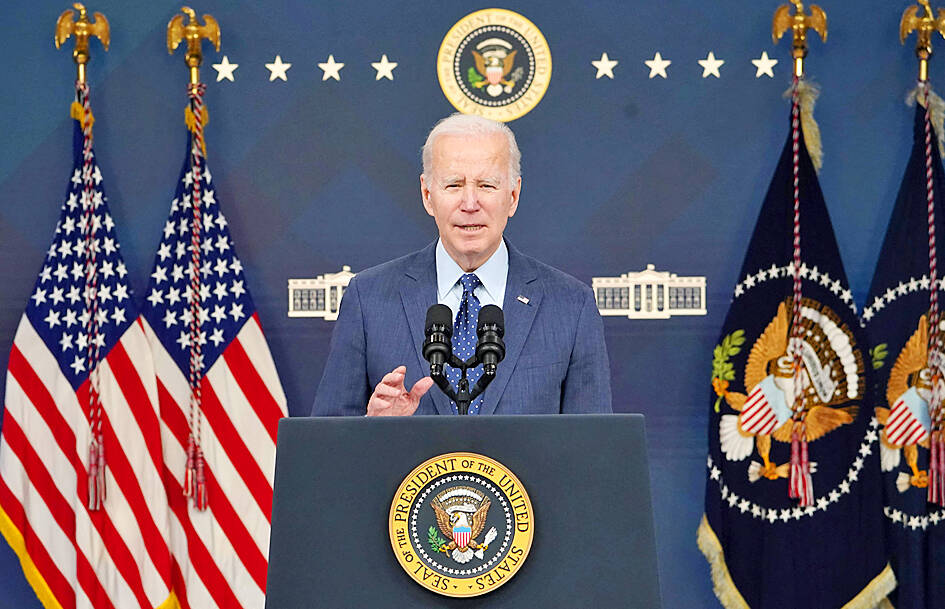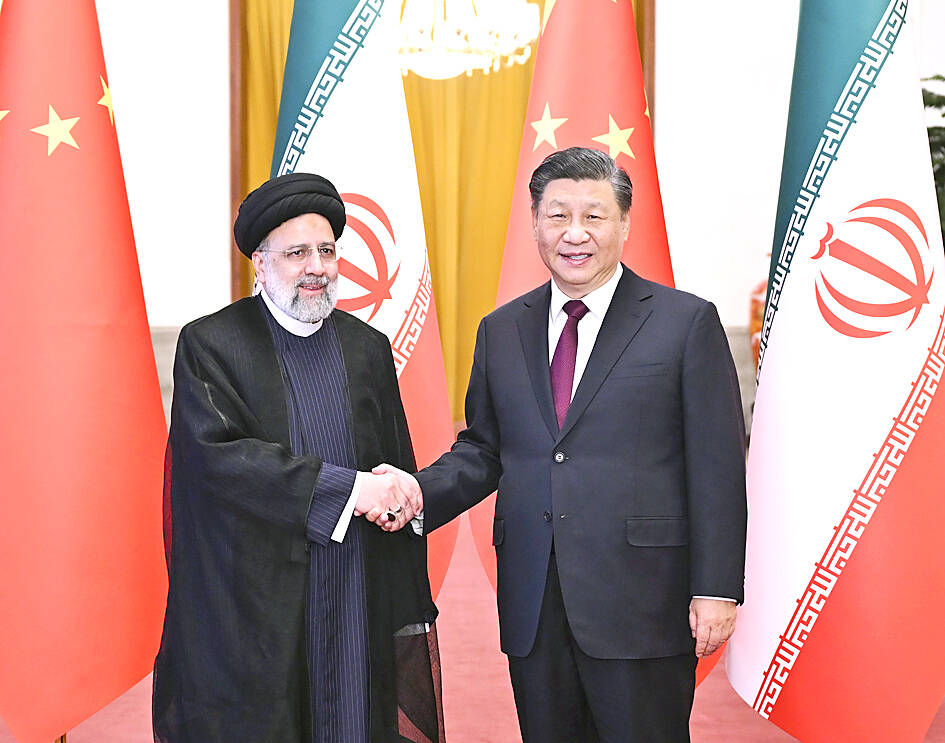US President Joe Biden said he expects soon to speak with Xi Jinping (習近平) about the Chinese spy balloon shot down by the US earlier this month, signaling a desire to end a dispute that has highlighted the fragility of relations between the world’s biggest economies.
Biden disclosed plans for the call as part of his most extensive remarks yet about the balloon saga, which led the US to destroy three other still-unidentified objects.
He pledged to “responsibly manage” competition with China “so that it doesn’t veer into conflict.”

Photo: AFP
“I expect to be speaking with President Xi, and I hope we have a — we are going to get to the bottom of this,” Biden said. “But I make no apologies for taking down that balloon.”
Biden, who is planning to visit Europe ahead of the one-year anniversary of the Russian invasion of Ukraine on Friday next week, did not specify when he intended to speak with Xi.
Since taking office two years ago, Biden has repeatedly leveraged his personal relationship with Xi — forged when the two leaders served as vice presidents — to keep disputes from escalating.

Photo: EPA-EFE / XINHUA / YAN YAN
Biden and Xi also spoke after the beginning of the Ukraine war and days before then-US House of Representatives speaker Nancy Pelosi visited Taiwan in August last year.
Their first face-to-face meeting in November at a summit in Indonesia appeared to represent a breakthrough, coming as part of a wider push by Xi to ease diplomatic disputes and focus on rebuilding China’s COVID-19-battered economy.
“Without clear directions from the top, it is difficult for the lower levels to properly manage the incident,” said Vivian Zhan (詹晶), a professor of Chinese politics at the Chinese University of Hong Kong. “Biden’s gesture suggests that the tension has escalated to the degree that it hurts the US interest as much as it does China, and needs to be contained.”
In another sign that both sides are eager to turn the page, US Secretary of State Antony Blinken is said to be weighing a meeting with Chinese Central Foreign Affairs Commission Director Wang Yi (王毅) on the sidelines of the Munich Security Conference, which began in the southern German city yesterday.
The balloon’s transit over the US and Canada prompted Blinken to cancel a trip to Beijing that had been planned in the wake of the earlier Biden-Xi meeting.
While China initially expressed regret over what it said was the balloon’s accidental passage over US territory, it has denied that the craft was intended for spying and denounced the decision to shoot it down as an “overreaction.”
Meanwhile, Wang on Thursday told Italian Minister of Foreign Affairs Antonio Tajani that Xi is planning to deliver a “peace speech” to mark the first anniversary of Russia’s invasion, Italian radio station reported.
Wang “told me that Xi will deliver a peace speech on the anniversary of the invasion of Ukraine,” Tajani told RAI a day after meeting the Chinese top diplomat in Rome.
Additional reporting by Reuters

CHAOS: Iranians took to the streets playing celebratory music after reports of Khamenei’s death on Saturday, while mourners also gathered in Tehran yesterday Iranian Supreme Leader Ayatollah Ali Khamenei was killed in a major attack on Iran launched by Israel and the US, throwing the future of the Islamic republic into doubt and raising the risk of regional instability. Iranian state television and the state-run IRNA news agency announced the 86-year-old’s death early yesterday. US President Donald Trump said it gave Iranians their “greatest chance” to “take back” their country. The announcements came after a joint US and Israeli aerial bombardment that targeted Iranian military and governmental sites. Trump said the “heavy and pinpoint bombing” would continue through the week or as long

TRUST: The KMT said it respected the US’ timing and considerations, and hoped it would continue to honor its commitments to helping Taiwan bolster its defenses and deterrence US President Donald Trump is delaying a multibillion-dollar arms sale to Taiwan to ensure his visit to Beijing is successful, a New York Times report said. The weapons sales package has stalled in the US Department of State, the report said, citing US officials it did not identify. The White House has told agencies not to push forward ahead of Trump’s meeting with Chinese President Xi Jinping (習近平), it said. The two last month held a phone call to discuss trade and geopolitical flashpoints ahead of the summit. Xi raised the Taiwan issue and urged the US to handle arms sales to

BIG SPENDERS: Foreign investors bought the most Taiwan equities since 2005, signaling confidence that an AI boom would continue to benefit chipmakers Taiwan Semiconductor Manufacturing Co’s (TSMC, 台積電) market capitalization swelled to US$2 trillion for the first time following a 4.25 percent rally in its American depositary receipts (ADR) overnight, putting the world’s biggest contract chipmaker sixth on the list of the world’s biggest companies by market capitalization, just behind Amazon.com Inc. The site CompaniesMarketcap.com ranked TSMC ahead of Saudi Aramco and Meta Platforms Inc. The Taiwanese company’s ADRs on Tuesday surged to US$385.75 on the New York Stock Exchange, as strong demand for artificial intelligence (AI) applications led to chip supply constraints and boost revenue growth to record-breaking levels. Each TSMC ADR represents

State-run CPC Corp, Taiwan (CPC, 台灣中油) yesterday said that it had confirmed on Saturday night with its liquefied natural gas (LNG) and crude oil suppliers that shipments are proceeding as scheduled and that domestic supplies remain unaffected. The CPC yesterday announced the gasoline and diesel prices will rise by NT$0.2 and NT$0.4 per liter, respectively, starting Monday, citing Middle East tensions and blizzards in the eastern United States. CPC also iterated it has been reducing the proportion of crude oil imports from the Middle East and diversifying its supply sources in the past few years in response to geopolitical risks, expanding